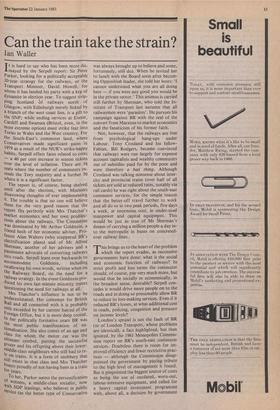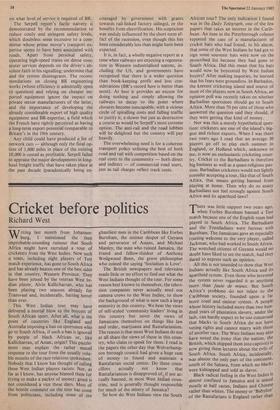Can the train take the strain?
Ian Waller
is hard to say who has been more dis- imayed by the Serpell report: Sir Peter Parker, looking for a politically acceptable 20-year strategy for the railways, or the Transport Minister, David Howell, for whom it has landed his party with a keg of dynamite in election year. To suggest strip- Ping Scotland Of railways north of Glasgow, with Edinburgh merely linked by a branch of the west coast line, is a gift to the SNP; while ending services at Exeter, Cardiff and Swansea (Bristol, even, in the most extreme option) must strike fear into Tories in Wales and the West country. For the South-East's commuter land, where Conservatives made significant gains in 1979 as a result of the NUR's strike-happy habits, Serpell *offers fares related to costs — a 40 per cent increase in season tickets over the level of inflation. There are 16 seats where the number of commuters ex- ceeds the Tory majority and a further 30 where it is a significant factor.
The report is, of course, being shelved until after the election, with Ministers disavowing thoughts of ever implementing It. The trouble is that no one will believe them for the very good reason that the report fits perfectly with Mrs Thatcher's market economics and her own predilec- tions about the railways. The Committee was dominated by Mr Arthur Goldstein, ,a friend both of her economic adviser, Pro- fessor Alan Walters (who scuppered BR's electrification plans) and of Mr Alfred Sherman, another of her advisers and a passionate advocate of converting railways into roads. Serpell leant over backwards to accommodate Goldstein, including swallowing his own words, written when on the Railways Board, on the need for a railway strategy. In the event Goldstein pro- duced his own last-minute minority report questioning the need for railways at all. Mrs Thatcher's influence is not to be underestimated. Her contempt for British trail and all connected with it is probably °rIlY exceeded by her current hatred of the F, oreign Office, but it is more deep rooted. In her politically formative years BR was the most public manifestation of na- tionalisation. She also comes of an age and class for whom the motor car was the ultimate symbol, putting the successful grocer and his offspring above their lower- Middle-class neighbours who still had to re- ly on trains. It is a form of snobbery that !till exists in that class and Mrs Thatcher boasts proudly of not having been in a train for Years.
To her, Parker seems the personification of wetness, a middle-class socialist, now With SDP leanings, who believes in public service (as the better type of Conservative was always brought up to believe and some, fortunately, still do). When he invited her to lunch with the Board soon after becom- ing Opposition leader, she told her hosts: 'I cannot understand what you are all doing here — if you were any good you would be in the private sector.' This animus is carried still further by Sherman, who told the In- stitute of Transport last autumn that all railwaymen were 'parasites'. He pursues his campaign against BR with the zeal of the convert from Marxism to market economics and the fanaticism of his former faith.
Not, however, that the railways are free from psychological hang-ups under Labour. Tony Crosland and his fellow- Fabian, Bill Rodgers, became convinced that railways were run largely for expense account capitalists and wealthy commuters out of subsidies paid for by the poor and were therefore a bad thing. Although Crosland was talking nonsense about inter- city and provincial trains (over half of all tickets are sold at reduced rates, notably via rail cards) he was right about the south-east commuter services, for the simple reason that the better-off travel further to work and all do so in two peak periods, five days a week, at enormous cost, in under-used manpower and capital equipment. This would be just as true of Mr Sherman's dream of carrying a million people a day in- to the metropolis in buses on concreted- over railway lines.
This brings us to the heart of the problem which the report evades, as successive governments have done: what is the social and economic function of railways? In strict profit and loss terms the commuter should, of course, pay very much more, but would that be socially or economically, in the broadest sense, desirable? Serpell con- cedes it would drive more people on to the roads and in doing so presumably allow BR to reduce its loss-making services. Even if it reduced BR's losses, at what additional cost in roads, policing, congestion and pressure on income levels?
London's sprawl is not the fault of BR (or of London Transport, whose problems are identical), a fact highlighted, but then ignored, by the 1961 Monopolies Commis- sion report on BR's south-east commuter services. Doubtless there is room for im- proved efficiency and fewer rectrictive prac- tices — although the Commission disap- pointed the government by paying tribute to the high level of management it found. But it pinpointed the biggest source of costs as being the use of outdated, worn-out, labour-intensive equipment, and called for a heavy capital investment programme with, above all, a decision by government on what level of service it required of BR.
The Serpell report's facile naivety is demonstrated by the recommendation to reduce costly and stringent safety levels, which doubtless seem excessive to a com- mittee whose prime mover's transport ex- pertise seems to have been associated with roads. Apart from personal safety, operating high-speed trains on dense com- muter services depends on the driver's ab- solute faith in his signalling; undermine that and the system disintegrates. The recom- mendations on closing BR engineering works (whose efficiency is admittedly open to question) and relying on cheaper im- ported equipment ignore the impact on private sector manufacturers of the latter, and the importance of developing the already considerable export of high quality equipment and BR expertise, a field which the French have rightly perceived as having a long-term export potential comparable to Britain's in the 19th century.
Any child could have produced a list of network cuts — although only the final op- tion of 1,600 miles in place of the existing 10,000 is costed as profitable. Serpell failed to appraise the major developments in long- haul freight traffic that have taken place in the past decade (paradoxically being en- couraged by government with grants towards rail-linked factory sidings), or the benefits from electrification. His scepticism was unduly influenced by the short-term ef- fect of the recession, even though this has been considerably less than might have been expected.
It is, in fact, a wholly negative report at a time when railways are enjoying a regenera- tion in Western industrialised natons, in- cluding the US, and governments have recognised that there is a wider question than book-keeping profit and loss con- siderations (BR's record here is better than most). At best it provides an excuse for doing nothing and simply allowing the railways to decay to the point where closures become inescapable, with a vicious circle of spiralling costs and falling traffic to justify it; a slower but just as destructive a course as would be Serpell's most extreme option. The anti-rail and the road lobbies will be delighted but the country will pay heavily.
The overwhelming need is for a coherent transport policy utilising the best of both road and rail with competition based on the real costs to the community — both direct and indirect — of commercial road users, just as rail charges reflect track costs.







































 Previous page
Previous page